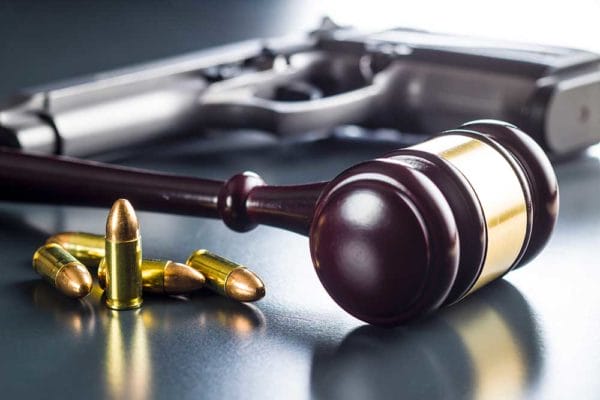
On April 18, 2024, the Supreme Court of Arkansas delivered a significant opinion impacting the restoration of the right to keep and bear arms. In particular, the court reaffirmed the right to bear arms is a fundamental constitutional right. The denial of the right is a harm that confers standing to those denied, and the procedural powers of the state judiciary, as a separate, constitutionally created branch of the state government, do not necessarily extend beyond the courtroom to the courthouse.
The issue was whether Arkansas state statute § 5-73-122 – b, as modified in 2017, violated the Arkansas state constitution. The state constitution grants separate powers to the state judiciary. Before 2017, the statute limited who could possess handguns in courtrooms. Officers of the court (lawyers) were allowed. Here is the relevant statute from 2015:
(b) (1) Any person other than a law enforcement officer, officer of the court, or bailiff, acting in the line of duty, or any other person authorized by the court, who possesses a handgun in the courtroom of any court of this state is guilty of a Class D felony.
The law was changed in 2017. It is significant the statute now adds courthouse as well as courtroom. Courthouses have many functions. Some of those functions are not administrated by the judiciary. Courthouses often house other administrative offices. Here is the current law (2024):
(b) However, a law enforcement officer, either on-duty or off-duty, officer of the court, bailiff, or other person authorized by the court is permitted to possess a handgun in the courtroom of any court or a courthouse of this state.
In 2020, a lawyer, Mr. Corbit, was prevented from bringing a firearm into the Pulaski County District Courthouse. The case became complicated. The Supreme Court ruled against him. Other attorneys joined the case in a second attempt. They abandoned the argument regarding courtrooms and limited their case to courthouses. The second case went to the Supreme Court again. Because the first case had gone to a conclusion with Corbit, he was precluded from bringing a second case. The other attorneys still had standing. From the Arkansas Supreme Court ruling:
When a plaintiff has alleged an intention to engage in a course of conduct affected with a constitutional interest, but proscribed by a statute, and there exists a credible threat of prosecution thereunder, he “should not be required to await and undergo a criminal prosecution as the sole means of seeking relief.” Doe v. Bolton, 410 U.S. 179, 188 (1973). It then becomes evident that the remaining appellants possess a vested and ongoing interest in the matter. Therefore, the circuit court erred when it barred their claims for lack of standing.
This is a critical understanding of “standing” for Second Amendment lawsuits. The credible threat of prosecution for exercising a right guaranteed by the Second Amendment is itself a significant and irrevocable harm.
Under the Supreme Court guidance as given in the Bruen decision on June 22, 2022. It is understood there were three “sensitive areas” where the right to bear arms could be limited when the Second Amendment was ratified in 1791. As mentioned in an article by prominent Second Amendment scholars Dave Kopel and Stephen Halbrook, there were only three locations that were considered “sensitive places in 1791:
And the types of laws in place at the Founding tell us that sensitive places are limited, and they are areas where the government has taken on a particular responsibility for providing for the care and safety of individuals in the location. This is plainly true of legislative assemblies, court houses, and polling places.
Court houses are included. It appears the legislature has the authority to determine who may possess guns in courthouses. The Arkansas Supreme Court held the legislature had authorized attorneys to do so:
We further hold that attorneys, as officers of the court, are authorized by statute to possess handguns in courthouses. We reverse the circuit court’s denial of the petition for a declaratory judgment as it pertains to the remaining plaintiffs and remand for further proceedings consistent with this opinion.
The Arkansas Supreme Court concluded they would address the issue of lawyers carrying weapons into courtrooms if the issue were to come up in a future case.
The most important part of this case is the recognition of standing for people who are threatened with criminal prosecution for exercising rights protected by the Second Amendment. In the Bruen decision, the Supreme Court made crystal clear the Second Amendment is a fundamental part of the Bill of Rights. It is to be afforded the same respect as other parts of the Bill of Rights, particularly the First Amendment. The Second Amendment is not to be treated as a second class member of the Bill of Rights.
The secondary part of this is the normalization of the right to self-defense and the right to carry. When lawyers demand the right to carry where they work as a fundamental right, it is hard for them to argue that others should be denied the same right.
About Dean Weingarten:
Dean Weingarten has been a peace officer, a military officer, was on the University of Wisconsin Pistol Team for four years, and was first certified to teach firearms safety in 1973. He taught the Arizona concealed carry course for fifteen years until the goal of Constitutional Carry was attained. He has degrees in meteorology and mining engineering, and retired from the Department of Defense after a 30 year career in Army Research, Development, Testing, and Evaluation.

from https://ift.tt/vzTXZJj
via IFTTT

No comments:
Post a Comment